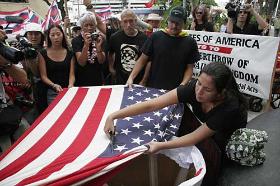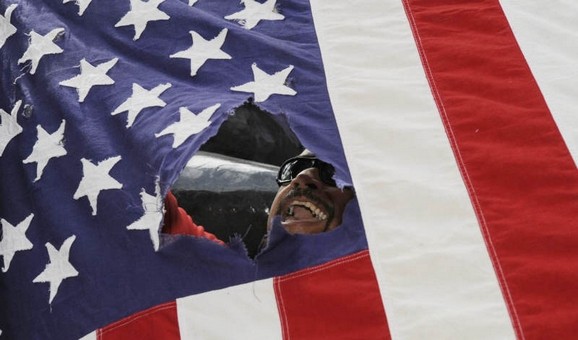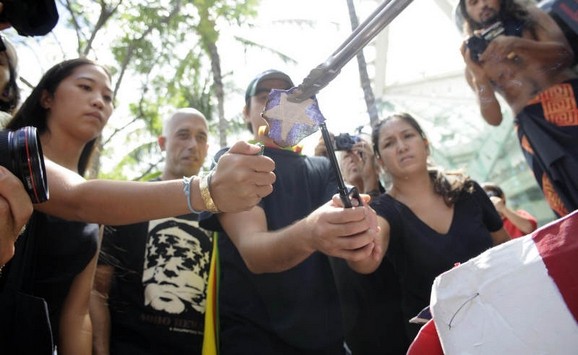(c) Copyright August 2009 in honor and celebration of the 50th anniversary of Hawaii Statehood, by
Kenneth R. Conklin, Ph.D.
All rights reserved
August 21, 2009 was the golden jubilee of Hawaii statehood -- 50 years since the 50th state had been admitted to the union of states. It was a day to be celebrated with parades and fireworks. Wasn't it? Well, in a manner of speaking it was.
The only people parading through the streets were anti-statehood protesters. They carried an effigy of Uncle Sam and beat him with sticks to knock his head off. From inside his head they took out an American flag, and used a knife to cut off the 50th star. Then they burned the star -- the only fireworks on this day.
* That desecration of Uncle Sam and Old Glory can be seen at the end of a video about the parade from KITV television:
http://www.kitv.com/video/20500749/index.html
* A 10-minute YouTube video was produced by the protesters themselves, proudly showing not only the cutting-off of the 50th star but also their yelling and screaming of anti-American sentiments INSIDE the Convention Center where the Statehood Day commemorative conference was in progress.
https://www.youtube.com/watch?v=2rtv39lfXOU
The Honolulu daily newspapers printed photos:
* The 50th star being cut off the U.S. flag. Photo from Honolulu Star-Bulletin August 22, 2009 with original URL
http://media.starbulletin.com/images/280*186/20090822_nws_stateLEDE.jpg

* The flag with a hole where 50th star had been and a protester grinning through the hole. Photo from Honolulu Advertiser August 21, 2009 with original URL
http://www.honoluluadvertiser.com/apps/pbcs.dll/gallery?Site=M1&Date=20090821&Category=STATEHOOD01&ArtNo=908210813&Ref=PH&Params=Itemnr=5#gallerytop

* The 50th star being burned. Photo from Honolulu Advertiser August 21, 2009 with original URL
http://www.honoluluadvertiser.com/apps/pbcs.dll/gallery?Site=M1&Date=20090821&Category=STATEHOOD01&ArtNo=908210813&Ref=PH&Params=Itemnr=6#gallerytop

Excerpts from newspaper reports are provided at the end of this article, describing not only the main protest in Honolulu but also other protests on Kauai, Maui, and Hawaii Island (the "Big island").
What motivated this outpouring of anti-American rage? The reasons are complex and dangerous not only for Hawaii but for all America.
The fact that militant secessionists were successful in preventing any celebration and then staging anti-statehood marches should serve as a warning that Congress must not pass the Native Hawaiian Government Reorganization bill (S.1011 and H.R.2314), also known as the Akaka bill. The main purpose of that bill is to authorize creation of a phony Indian tribe -- a racially exclusionary government which will then negotiate with the U.S. and State of Hawaii for money, land, and jurisdictional authority. Some ethnic Hawaiians favor that bill, while most probably oppose it. Some ethnic Hawaiians are secessionists or racists, while most (the silent majority) are proud to be American but too mild-mannered or intimidated to stand up in public.
Although the Akaka bill is not explicitly secessionist, it can be seen as a trojan horse for secession. If the bill passes it will end up sending money, land, and political power to be controlled by the most radical, racist, and anti-American members of this ethnic group. And the bill itself would establish a precedent for the creation of a Nation of Aztlan demanding the secession of several Southwestern states. See the book "Hawaiian Apartheid: Racial Separatism and Ethnic Nationalism in the Aloha State" at
http://tinyurl.com/2a9fqa
See also "Hawaiian Nationalism, Chicano Nationalism, Black Nationalism, Indian Tribes, and Reparations -- Akaka Bill Sets a Precedent for the Balkanization of America" at
http://tinyurl.com/722l4
Also "The Akaka Bill And Secession: The Hawaiian Government Reorganization bill (Akaka bill) is seen by its supporters as a step toward total independence for all of Hawaii"
http://tinyurl.com/4cho6
and
"Hawaii's Fifth Column: Anti-Americanism in the Hawaiian Sovereignty Movement"
http://tinyurl.com/5t3nc
Rubellite Kawena Johnson is a patriotic ethnic Hawaiian Professor Emerita of Hawaiian Language and Literature, with 50% native blood quantum, who is descended from Kamehameha The Great and also from two Mayflower pilgrims. She says passing the Akaka bill would split her personally in half, would split Hawaii in half, and would begin the breakup of America.
http://tinyurl.com/3mdmv
Examples of the cultural and emotional divisiveness of the Akaka bill can be found in a series of one-minute videos and audios provided at
http://akakabill.org/audio-downloads/
Examples of racist attitudes proudly proclaimed by well-educated Hawaiian activists can be seen at "Dialogs with a racist" at
http://tinyurl.com/laewws
How was it decided there should be no celebration of Hawaii's 50th anniversary? What happened in previous years?
The official Hawaii 50th Anniversary of Statehood Commission made a decision more than a year beforehand that there would be no celebration, but only a commemoration. There would be no parades or fireworks, only a low-key conference at the Hawaii Convention Center including a jobs fair and various panels discussing predictions and hopes for the next 50 years. Also, each week for 50 weeks before the golden anniversary there would be a one-minute public service announcement on TV and radio featuring nostalgic reminiscences about what Hawaii had been like 50 years ago, or how excited people were when President Eisenhower had made his announcement.
The politically correct word "commemoration" was chosen after extensive discussion by the planning Commission, because any real celebration would certainly have spawned noisy protests from a militant secessionist minority among Hawaii's 20% minority of ethnic Hawaiians. The secessionists claim that the State of Hawaii is a fake state. To understand these historical claims and why they are bogus, see "Hawaii Statehood -- straightening out the history-twisters. A historical narrative defending the legitimacy of the revolution of 1893, the annexation of 1898, and the statehood vote of 1959" at
http://tinyurl.com/n2zzeo
The secessionists claim Hawaii has been under belligerent military occupation by an oppressive foreign power (the U.S.) for more than a century, just as Hungary was occupied by the Soviet Union and Tibet remains occupied by China; and it's time for the U.S. to withdraw. Fearing possible violence from the militant secessionists, Hawaii was not allowed to have a celebration but only a commemoration, much as we commemorate the December 7, 1941 bombing of Pearl Harbor.
Although Statehood Day has long been an official holiday in Hawaii (state and local government workers get the day off with pay), there have been no celebrations for many years. The reasons include fear and intimidation; but also leftist "political correctness", plus a general attitude of love and respect for Hawaiian culture and the people who created it. Hawaii's state bird is the endangered nene; and the state fish is the colorful humuhumunukunukuapuaa. The state's highly favored race is ethnic Hawaiians, who have been informally adopted by Hawaii's multiracial society as a sort of state pet or mascot, dearly beloved and entitled to race-based control over three branches of the state government plus exclusive benefits from hundreds of race-specific federal, state, and private programs. See "Native Hawaiians as the State Pet or Mascot: A Psychological Analysis of Why the People of Hawaii Tolerate and Irrationally Support Racial Separatism and Ethnic Nationalism"
http://tinyurl.com/3he27
State Senator Sam Slom decided to personally organize a celebration in 2006, after Governor Linda Lingle refused to authorize a government event. In his August 8 announcement of his plans in Hawaii Reporter (online) he wrote "The last major observance took place in Candlestick Park, San Francisco. Then Gov. Ben Cayetano was quoted as saying a celebration in Hawaii had become too controversial and 'might now be perceived as culturally insensitive by Native Hawaiian leaders.'"
The 2006 celebration organized by Senator Slom was set for the grounds of Iolani Palace. That building, now a museum, was exactly the historically correct place for a Statehood Day celebration. It served as the Territorial capitol building from 1898 to 1968, where the Territorial Legislature and Governor had their offices. The transition from Territory to State took place there in 1959, where huge crowds celebrated. See photos and news reports from 1959 at
http://tinyurl.com/4ja77m
But in recent years, since a new state capitol was built, the Palace has been where the secessionists stage large rallies, because they regard it as their capitol of a still-living Kingdom of Hawaii. See photos at
http://tinyurl.com/8aloj
On Statehood Day, Friday August 18, 2006, a gang of militant secessionists arrived at the Palace before Senator Slom's celebration was scheduled to begin. They hung their banners from the trees, set up a sound system, and played loud music. They walked up to the children of the Kalani High School Band who were seated with their instruments, made threats, and yelled through a megaphone "You'd better leave because bad things are going to happen." So of course the parents, fearing for the childrens' safety, took them back to the bus. The militants then swarmed the would-be celebrants, cursing and screaming in their faces. Although Senator Slom had an official permit to use the Palace grounds, there was no security; and police who were on duty in the Palace basement never came out to restore order. For a compilation of news reports and commentaries about what happened, see
http://tinyurl.com/pdt88
Let's review how successful the anti-American secessionists have been at intimidating patriotic Americans and the State government. In 2006 they disrupted and destroyed a Statehood Day celebration at the very place where Statehood had been proclaimed and celebrated in 1959 -- they scared away the children and parents of a high school band by threatening them, and then swarmed the would-be celebrants who included a State Senator and State Representative, screaming anti-American nonsense in their faces -- while police in the basement of the building did not come out to protect the celebrants or restore order.
In 2008 they intimidated the government 50th Anniversary of Statehood Day Planning Commission into replacing a celebration with a mere commemoration for fear that otherwise there would be violence, and they also intimidated the commission into not allowing any government commemorative events to happen at the place where Statehood happened in 1959.
In 2009 on Statehood Day they marched through the streets, bashed the head off an effigy of Uncle Sam, cut the 50th star off the U.S. flag, and burned it. Then they entered the Convention Center where a commemorative conference was underway, and loudly shouted anti-American slogans for an extended period of time. They never applied for a parade permit but were given one at the last minute anyway; a congenial Police Department assisted the marchers by coning off one or two lanes of a busy street; and Convention Center management made a prior agreement to allow the protesters to enter and use a stage and sound system. Meanwhile neither the government nor any private group dared to actually celebrate the official state holiday.
As noted earlier, if the Akaka bill passes it will end up sending money, land, and political power to be controlled by the most radical, racist, and anti-American members of the "Native Hawaiian" ethnic group. Why in the world would Congress want to do that?
Anti-American, anti-statehood protests happened not only in Honolulu but throughout the islands. Here are a few excerpts of news reports about the anti-statehood protest on August 21, 2009 in Honolulu (Oahu), Lihue (Kauai), Kahului and Wailuku (Maui), and Hilo (Hawaii Island).
Honolulu Advertiser, Friday, August 21, 2009
"Donald Cataluna, a trustee of the state Office of Hawaiian Affairs and a member of the Statehood Commission, fought against any statehood event at 'Iolani Palace, which he believes could have led to bloodshed and unwanted nationwide attention for Hawai'i. At least 30 Hawaiian sovereignty groups represent 30,000 Native Hawaiians, Cataluna said. "And many, many Hawaiians — many Hawaiians — would be very, very upset," Cataluna said. "It would not be a good idea to have an event at the site of the overthrow of their queen. It would be a horrible mess there. I had visions of blood spilling and I didn't want that."
Honolulu Star-Bulletin, August 21, 2009
"About 1,000 demonstrators who would rather see Hawaii's independence restored are expected to rally today outside the conference at the Hawaii Convention Center. 'We want to show how U.S. imperialism has spread across the Pacific and across the world,' said Lynette Cruz, an organizer of the Hawaiian Independence Action Alliance. 'It'll be fun.' ... Last year, police arrested 23 members of a Hawaiian pro-sovereignty group that broke into the palace, locked its gates and posted signs that read, 'Property of the Kingdom of Hawaiian Trust.' 'The state is very cognizant of Hawaiian protests, and I think they don't want to have any bad press,' said Dean Saranillio, a student who wrote his dissertation on how statehood came at the expense of Hawaiian self-determination. 'There's a very vibrant and vocal Hawaiian community that's well-versed in the history. They know statehood was a product of the overthrow.'"
Honolulu Star-Bulletin, August 22, 2009
"Thirteen chanters performed about an hour of Hawaiian oli, or chants, at Iolani Palace yesterday in tribute to Queen Liliuokalani — a protest of Hawaii's 50th anniversary of statehood. They chanted about the queen's glory, her loss and a desire to reclaim what Hawaiians lost. While they hold different views of Hawaiian sovereignty, they all support Hawaiian independence, said Manu Kaiama, the protest organizer. ... Another attendee was Lynette Cruz, who organized a protest at the Hawai'i Convention Center earlier in the day.
Hawaiians need to gather to celebrate their history and culture, and the solemn palace protest was a proper setting, she said. She said it contrasted the earlier political protest, where a lot of rage was released."
The Garden Island (Kaua'i), August 21, 2009
"A half-century after becoming de-facto citizens of America’s 50th state, some Hawaiians still believe joining the union was a poor decision, arguing it was illegal and has undermined Hawai‘i’s rich cultural heritage. ... A number of kanakas reached by The Garden Island this week argued that statehood is based on lies, and said educating Hawai‘i’s youth about the true nature of the Islands’ history is key to preserving the local culture. ... 'We are celebrating, but we’re celebrating the unity and freedom of our country,' Sylva said, referring not to America, but to Hawai‘i. Others echoed Sylva’s upbeat tone, expressing optimism and hope for a future free from what Sausen described as 'suppression, oppression and depression at the hands of American invaders."
The Maui News, August 19, 2009
"Two Maui protests are set to take place, said organizer Foster Ampong of Kahului. The first will be from 3 to 6 p.m. Thursday at the State Building on the corner of High and Main streets in Wailuku, since government workers have Statehood Day off on Friday. The second will run from noon to 1 p.m. Friday, the 50th anniversary of statehood, at the bridge on Keolani Place right before the Kahului Airport, Ampong said. 'We want to raise awareness that the whole process of statehood was really a fraud,' said Ampong, who hopes for hundreds of protesters, even on short notice. 'Most people who voted for statehood (in June 1959) were not even Native Hawaiians.'"
Hawaii Tribune-Herald (Hilo, the "Big Island"), Friday, August 21, 2009
"In Hilo, a vigil that began Thursday at the Kamehameha I statue will continue until Saturday, with people lining Kamehameha Avenue to wave signs protesting the illegal occupation by the United States. Kihei Soli Niheu, 66, who lives in the Pu'ukapu district near Waimea, said the last legal constitution was promulgated in 1864. ... A kanaka maoli who supports America is not a Hawaiian, he said. Niheu has spent decades organizing Hawaiian communities and has founded or supported various organizations. He founded Hawaii United for Liberation Independence in the 1970s, and is a supporter of Ko Hawaii Pae Aina, another sovereignty movement. While Niheu, Kaleleiki and others may have their differences, today members of the Hawaii independence movement put aside their differences stand together against the common enemy -- America."
==============
Send comments or questions to:
Ken_Conklin@yahoo.com
You may now
GO BACK TO OTHER TOPICS ON THIS WEBSITE
(c) Copyright August 2009 in honor and celebration of the 50th anniversary of Hawaii Statehood, by Kenneth R. Conklin, Ph.D. All rights reserved